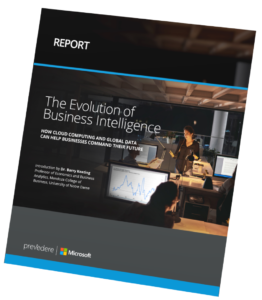Last Updated: January 12, 2021
Microsoft Q&A: Julie Shainock, managing director of travel and transportation for Microsoft, and Shane O’Flaherty, global director of travel and transportation for Microsoft, sit down with Pawan Murthy, senior director of marketing at Prevedere, to discuss how the sharing economy is permanently changing the travel and hospitality industry landscape and what types of data can make industry forecasting more accurate.
2018 Travel and Hospitality Industry Forecasting Challenges, a Microsoft Q&A
Prevedere: With so much data available today, accurate forecasting is more challenging than ever before. What specific planning and forecasting challenges does the hospitality and travel industry face?
Microsoft: Accurate, robust forecasting is always a challenge for the travel and hospitality industry sectors. In the past, the industry planned for factors such as seasonal effects on bookings to determine which rates and travel packages might convert at the highest rate among consumers.
In recent years, the sharing economy has become a disruptor to the industry, even as the use of Big Data has become more common. As little as a decade ago, companies like AirBnB, Lyft and Uber were mostly unheard of, let alone considered a challenge to the travel and hospitality industries. Now these multi-billion-dollar companies are regarded very highly by most millennials, and the impact of these travel disrupters is seen positively and negatively by different analysts. For consumers, the sharing economy presents a cost-effective, often high quality, alternative to traditional lodging and travel options. On the flipside, critics point out factors such as unfair competition, reduced job security and a loss of tax revenue.
To remain competitive for travel dollars, industry leaders will need to be able to accurately forecast demand and define new revenue models to compete. To realize more accurate, robust forecasting, the industry must incorporate more unstructured streams of data in their forecasting models to truly identify and inform future outcomes, including those that might have an effect on the company or market at large, factoring in global influences and disruptors.
Prevedere: What advancements in technology and analytics is the industry employing to address these challenges?
Microsoft: The industry is making advancements with technology to transform how consumers plan and experience travel. Mobility is moving beyond basic uses to improve the total trip experience, and AI is poised to transform how consumers plan travel. This technology offers the potential for business to realize cost-saving efficiencies and cut down overhead costs.
In the coming years, a confluence of technologies, including faster processing power, cloud computing and IoT-enabled devices, will come together to push the planning to the next level.
 Prevedere: What are the key indicators of a healthy travel and hospitality industry climate?
Prevedere: What are the key indicators of a healthy travel and hospitality industry climate?
Microsoft: Full flights are one key indicator of a healthy travel and hospitality industry. Both international and domestic flights are currently experiencing full capacity. It has been a slow ride back up, but industry forecasting is witnessing progressive growth with back-to-back numbers not seen since before the Great Recession. However, it is worth keeping in mind that many airlines reduced their capacity by around 30 percent in 2008 and never restored or replaced that lost volume.
Prevedere: There has been a lot of media buzz about the “Trump Slump” impacting foreign travel to the United States. Do you expect the industry to have to combat a slump in 2018?
Microsoft: In 2018, geopolitics continue to impede foreign travel to the United States. Issues around immigration, travel bans, the inability to secure visas and the general political climate are causing some international travelers to pause their trips to the U.S. for now. In fact, the U.S. could experience an $18 billion hit as a result of the political climate in Washington.
However, the U.S. experienced a similar issue during the Obama administration when a comment from the president about the use of high-end hotels and Las Vegas for conferences during a recession caused many businesses to choose more modest lodgings for business travel and conferences in tertiary cities. Luxury hotels experienced a 30 to 40 percent loss in bookings during that time, but have since rebounded.
 Prevedere: You mentioned that the growth in travel has been promising. What segments of the industry are experiencing the most growth?
Prevedere: You mentioned that the growth in travel has been promising. What segments of the industry are experiencing the most growth?
Microsoft: We have seen tremendous airline growth due to low oil prices. An increase in the use of shared services like AirBnB, which currently has more available inventory than hotels, is also driving growth, as are online car services such as Uber and Lyft. Consumers prefer the flexibility these apps offer compared to rentals, taxis or traditional car services.
Prevedere: How does Prevedere Demand Planning benefit travel and hospitality industry customers?
Microsoft: Prevedere Demand Planning offers insights that prepare travel and hospitality companies for fluctuating demand and industry disruptors that affect the bottom line. Leaders are enabled to make better forecasting decisions using real-time insights about the industry forecasting, markets and demand.
By using Prevedere, travel and hospitality industry leaders can be notified of headwinds and tailwinds to their performance 12 to 24 months in the future. To receive more information, inquire about Prevedere’s travel and hospitality solutions.
***
 In the Evolution of Business Intelligence report, Prevedere, an industry forecasting, insights and predictive analytics company, has partnered with Microsoft and Dr. Barry Keating, professor of economics and business analytics at the University of Notre Dame, to describe the critical turning point currently facing traditional analytics, as technology and data merge to help business leaders make smarter, faster, forward-looking decisions. Read the full report >>
In the Evolution of Business Intelligence report, Prevedere, an industry forecasting, insights and predictive analytics company, has partnered with Microsoft and Dr. Barry Keating, professor of economics and business analytics at the University of Notre Dame, to describe the critical turning point currently facing traditional analytics, as technology and data merge to help business leaders make smarter, faster, forward-looking decisions. Read the full report >>